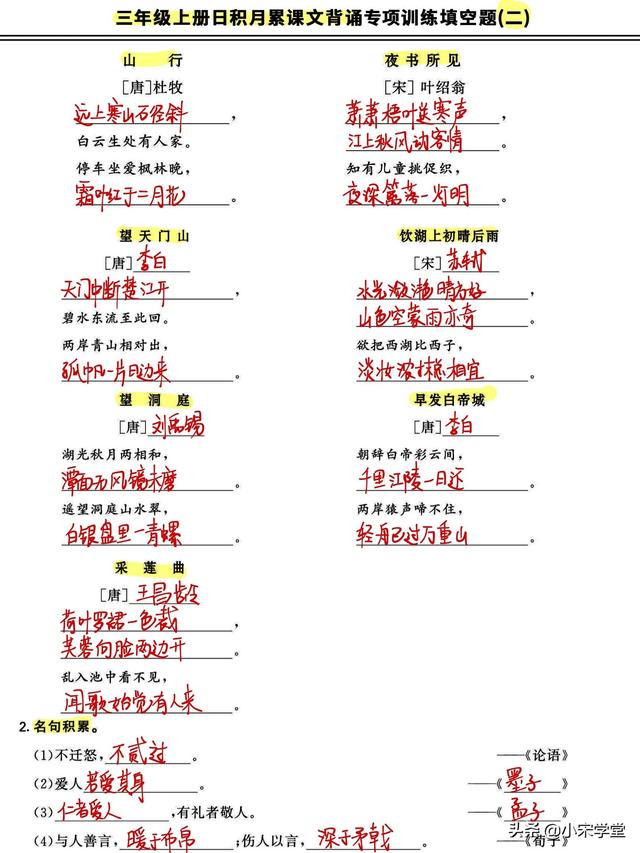Too和Enough在句子中的位置Too and enough can modify both nouns, adjectives, and adverbs. Too indicates that there is too much of a quality, or too much or too many of some object. Enough means that there is no need for more of a quality or object. Here are some examples:,我来为大家科普一下关于too和enough的用法区别?下面希望有你要的答案,我们一起来看看吧!

too和enough的用法区别
Too和Enough在句子中的位置
Too and enough can modify both nouns, adjectives, and adverbs. Too indicates that there is too much of a quality, or too much or too many of some object. Enough means that there is no need for more of a quality or object. Here are some examples:
Too和enough可以修饰名词、形容词和副词。Too表示某一特性太多,或某一物体量大或太多。Enough意味着不需要更多的质量或物体。以下是一些例子:
- She's too sad these days. I wonder what's wrong.
- I don't have enough sugar. Let's go to the supermarket.
- You're driving too slowly!
- There are too many students in this class. It should be smaller.
- This test is difficult enough already!
- We have too much pollution in the world.
阅读这些例子,你可能会注意到enough有时放在它所修饰的单词之前。例如:
- What do we need for dinner? I think we have enough vegetables, don't we?
- She feels that Tom has more than enough time to help.
在其他例子中,enough放在它所修饰的单词之后。例如:
- You should ask John for help. He's rich enough to help us all!
- I don't think they are smart enough to take that class.
看看上面例子中修改过的单词。你会注意到“enough”放在名词“vegetables”和“time”之前。Enough放在形容词rich和smart之后。
Enough的使用规则Adjective Enough
Place enough directly after the adjective modified when using enough as an adverb to mean to the required degree or extent.
当用enough作副词表示所要求的程度或范围时,把enough直接放在形容词修饰后。
- He's not patient enough to understand children.
- My friend wasn't intelligent enough to take the job.
Adverb Enough
当用enough作副词表示需要的程度或程度时,把enough直接放在修饰副词后。
- Peter drove slowly enough for us to look at all the houses.
- The students studied carefully enough to do well on the exam.
Enough Noun
把enough直接放在名词前面,表示有足够的数量。
- Do you have enough money for your vacation?
- I'm afraid we don't have enough oranges to make the dessert.
阅读下面的例子,你可以注意到“too”与名词、形容词和副词连用。然而,当too与名词连用时,too后面要跟much或many。too much或too many的选择取决于修饰的名词是可数名词还是不可数名词,也可称为可数名词和不可数名词。
- Anna is too concerned about her grades.
- The boys are too crazy today!
- We have too many books in this room.
- There is too much information to learn these days.
Too Adjective
Place too before adjectives to state that something has an excess amount of quality.
Too放在形容词前,表示某物具有过量的质量。
- He's too angry about that incident.
- Mary is too anxious about her cousin.
Too Adverb
too放在副词前,表示某人做的事情过分或超过必要。
- That man is driving too slowly. I wonder if he's been drinking.
- You are speaking too rudely to that man. It's important to be kind!
Too Much Uncountable Noun
在不可数名词前放置too much,表示某物数量过多。
- We have too much time on our hands this weekend.
- You've put too much sugar in the cake.
Too Many Countable Noun
在可数名词复数前放置too many表示物体的数量过多。
- Franca has too many problems to deal with this week.
- The boys have bought too many clothes. Let's take some of them back to the store.
改写句子,在句子中添加too或enough来修饰形容词、副词或名词。
- My friend isn't patient with his friends.
- I don't have time to get everything done.
- I think the test was difficult.
- There is much salt in this soup!
- You are walking slowly. We need to hurry up.
- I'm afraid I have many responsibilities.
- Peter isn't working fast. We'll never finish on time!
- I wish I were intelligent to pass this test.
- Is there wine for dinner?
- He types quickly, so he makes a lot of mistakes.
- My friend isn't patient enough with his friends.
- I don't have enough time to get everything done.
- I think the test was too difficult.
- There is too much salt in this soup!
- You are walking too slowly. We need to hurry up.
- I'm afraid I have too many responsibilities.
- Peter isn't working fast enough. We'll never finish on time!
- I wish I were intelligent enough to pass this test.
- Is there enough wine for dinner?
- He types too quickly, so he makes a lot of mistakes.





